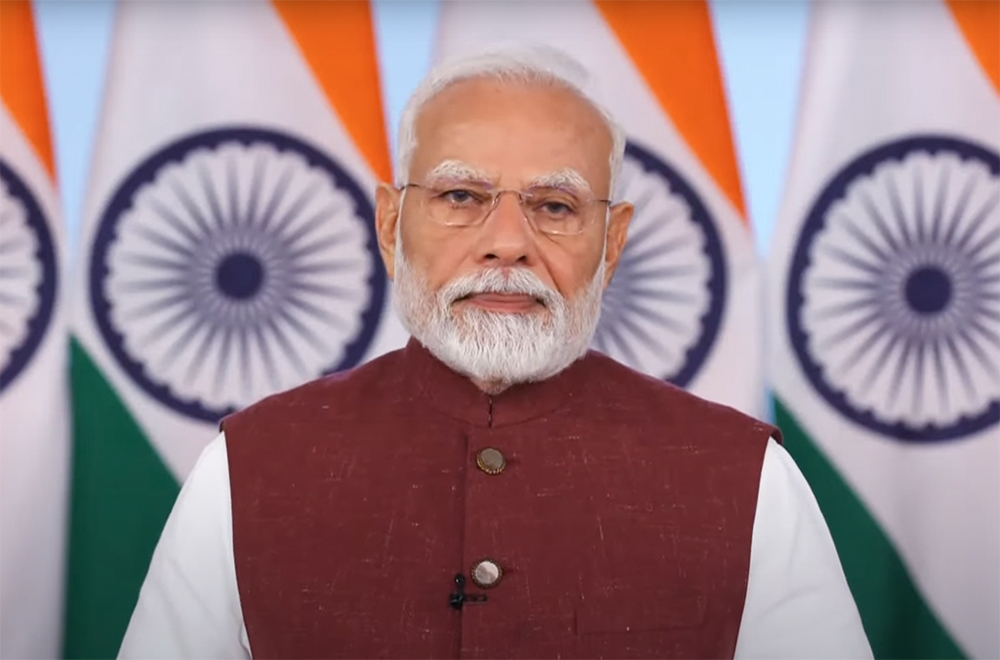Prime Minister Narendra Modi on Saturday inaugurated and laid the foundation stone for development projects worth over Rs 50,000 crore in Jharsuguda, Odisha, emphasizing the government’s commitment to accelerating the state’s progress. The projects span telecommunications, railways, education, healthcare, skill development, and rural housing, aimed at uplifting the poor, Dalits, backward classes, and tribal communities.
Addressing a large gathering, the Prime Minister extended Navratri greetings and expressed gratitude for the opportunity to visit the sacred land of Maa Samalei and Maa Ramachandi. He highlighted the presence of numerous women at the event, calling their blessings a source of strength. Reflecting on Odisha’s resolve during the 2024 Assembly elections to build a developed state, PM Modi noted that both the central and state governments are working in tandem to realize this vision.
A key highlight was the launch of Bharat Sanchar Nigam Limited’s (BSNL) indigenous 4G services, a significant step towards self-reliance in telecom technology. PM Modi announced that BSNL’s fully indigenous 4G network, comprising nearly one lakh towers, places India among the top five countries with homegrown 4G technology. The initiative, launched on BSNL’s 25th anniversary, will connect over 30,000 villages previously without high-speed internet, benefiting more than two crore people, especially in tribal and remote areas. The towers are also 5G-ready, ensuring future-ready connectivity.
The Prime Minister flagged off the Amrit Bharat Express train from Berhampur to Surat, enhancing connectivity and supporting tourism and trade. He also laid the foundation stone for a rail flyover at Sambalpur-Sarla and dedicated the doubling of the Koraput-Baiguda and Manabar-Koraput-Gorapur lines to boost freight and passenger movement. Union Railway Minister Ashwini Vaishnaw joined virtually from Surat.
In education, PM Modi launched the expansion of eight IITs across India, including new research parks, at a cost of Rs 11,000 crore, creating capacity for 10,000 students over four years. The MERITE scheme was introduced to modernize 275 state engineering and polytechnic institutions, ensuring quality technical education locally. In Odisha, the second phase of the Skill Development Project was launched, establishing World Skill Centres in Sambalpur and Berhampur and upgrading ITIs to provide advanced training in sectors like AgriTech and Renewable Energy.
Healthcare infrastructure received a boost with the foundation stone for upgrading MKCG Medical College in Berhampur and VIMSAR in Sambalpur into super-speciality hospitals. These facilities will include enhanced bed capacity, trauma care, and specialized services. Additionally, Modi distributed sanction orders to 50,000 beneficiaries under the Antyodaya Gruha Yojana, providing pucca houses to vulnerable families, including 40,000 tribal households under the PM Janman Yojana.
The Prime Minister announced the approval of two semiconductor units and a semiconductor park for Odisha, highlighting the state’s potential to become a hub for chip manufacturing. He also spoke of a Rs 70,000 crore shipbuilding package, expected to attract Rs 4.5 lakh crore in investments and create millions of jobs, benefiting Odisha’s industries.
PM Modi emphasized the government’s focus on empowering women, citing the “Swasth Nari, Sashakt Parivar” campaign, which has facilitated health screenings for over three crore women nationwide since September 17. He urged Odisha’s women to participate in the ongoing health camps addressing diseases like diabetes and cancer.
The Prime Minister also highlighted recent GST reforms effective from September 22, which have reduced taxes on essential goods, saving families Rs 15,000-20,000 annually. Farmers, he noted, are saving significantly on agricultural equipment, with tax reductions of up to Rs 40,000 on tractors. However, he criticized opposition-led governments, alleging they impose additional taxes, citing Himachal Pradesh’s tax on cement as an example.
Odisha Governor Dr. Hari Babu Kambhampati, Chief Minister Mohan Charan Majhi, and Union Minister Jual Oram were present, along with other dignitaries. Several Union Ministers and Chief Ministers joined via videoconference, underscoring the event’s national significance.
The projects, including solar-powered 4G towers and Wi-Fi facilities for 130 higher education institutions in Odisha, reflect the government’s commitment to sustainable development and digital inclusion, ensuring Odisha’s rapid progress towards prosperity.










